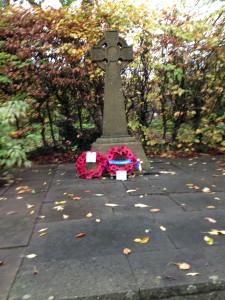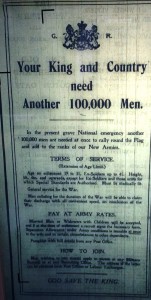Mr W. J. Weld presided at the meeting on Thursday, and there were also present: Mr Ridley Brown, Mr A. Spencer, Mr A. Fairfax (clerk), Mr George Elkington (surveyor), and Mr J. Smith (inspector).
The Late Lieutenant Holbech – Letters of Sympathy
Before proceeding with the business, the Chairman moved that a vote of sympathy be passed to Mrs Holbech of Farnborough, the mother of Lieutenant Holbech on his death in the service of his country, and also with Mr Ronald Holbech, his brother, who was formerly a member of the Council. he was sure they all sympathised with the family in the great sorrow which had befallen them, and he moved that letters of sympathy be sent to Mrs Holbech and also Mr R. Holbech.
The Chairman moved the adoption of the report, and said they were starting with ten boys.
The Clerk read a letter from Mr William Bliss, chairman of the Cottage Homes Committee at Wallingford, saying how pleased he was the Banbury Guardians were adopting the system of a children’s cottage home, a system which was most desirable for the training of pauper children if they got the right officials at the home. At Wallingford, the children looked upon the superintendent as a father. Although the initial expenses might look heavy, it was really a good investment for the union as none of the children were likely to come on the rates when they had grown up. The children from their home were all in creditable positions and earning their own living. He hoped the Banbury board would be as successful as they had been (hear, hear).
The Chairman explained, in answer to Mr Butler, that they accepted the tender for bread at sixpence sent in by a Banbury baker on the ground that the North Newington baker went into Horley every day and they would have the advantage of getting the bread fresh.
The Local Government Board and the Relief of Widows and Children
A circular letter from the Local Government Board was read on this object, which was postponed from the last meeting. It had reference to the position brought about by the war.
Mrs Gillett said she thought the circular was a step in the right direction. It pointed out that they should feel, as Guardians, the responsibility with regard to every child they gave relief to, whether in out-relief or in homes and institutions. It would be well to ask their relieving officers to get out a list of all the children who were being relieved and they, as Guardians, ought to go and see them in order to find out if any were not being properly taken care of. She proposed accordingly.
Miss Colegrove said that she had thought over this matter for some time. They had already visited the children and tried to help them, but she felt, more and more, there was more work to be done in that direction. A great deal more could be done by careful supervision, and there was more than one or two could manage.
Mr Chard said that with the officers they had they would be able to treat all the cases on their merits.
Mr Preston seconded Mris Gillett’s proposition.
Mr Hollier said he thought the lady visitors and the relieving officers could do all that was necessary.
Mr Butler said they wanted the Guardians themselves to take a keener interest in this work. They were the people to give sympathy, advice and help. They could do it better than the officials. Officials were a nuisance and the more they had, the more trouble they would have – (laughter).
Glass Eye for a Pauper
An application was received in respect of a woman at Hook Norton who had broken her glass eye and wanted a new one.
A discussion was proceeding on the subject and Mr Bloomfield said he noticed in one Union that the Guardians had agreed to buy a woman a false nose in order that she might be more presentable when asking for employment – (laughter).
The Local Relief Committee
Mr C. Bradford, the honorary secretary of the local committee in connection with the Prince of Wales’ Fund, asked for the Board Room for hilding the meetings, and this was readily granted.
This was all the public business.

